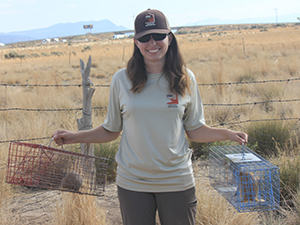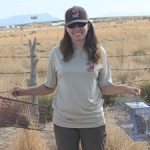
Wildlife Technician I
Opening date: March 22, 2024
Closing date: April 7, 2024
Salary: $15.18 per hour
Location: Cedar City, Utah
Time frame: June 10–Oct. 4, 2024
Positions available: 6–9
Housing: Not provided
The Utah Division of Wildlife Resources has six (6) to nine (9) nonbenefitted Utah prairie dog technician positions available in Cedar City, Utah. This appointment will run from June 10 to Oct. 4, 2024. Housing is not provided.
Utah prairie dogs are listed as federally threatened under the Endangered Species Act. The species has a history of conflict with humans, particularly in urban and agricultural settings. The Division works to help manage and recover the species.
Successful applicants will conduct field operations in support of the Range-wide General Conservation Plan for Utah Prairie Dogs and the Utah Prairie Dog Recovery Plan in southwest Utah.
Vehicles and other equipment needed to accomplish required tasks will be provided.
Job duties
- Trapping, handling and translocation of Utah prairie dogs
- Performing development surveys for the presence/absence of Utah prairie dogs
- Recording data for Utah prairie dog trapping, translocation and monitoring
- Other miscellaneous tasks benefitting the Utah prairie dog program
Considerations
- Weather conditions vary greatly, from cold (20° F) to hot (105° F) temperatures, with heavy rain and recurring afternoon thunderstorms
- Work schedules are usually 40 hours per week, but may be 45 to 50 hours per week during peak season
- Technicians will be working in remote locations with minimal cell service on rough dirt roads
- Technicians will be based out of Cedar City, except for when staying at field housing for up to two weeks in the summer (groceries provided)
- Technicians will be working in the field at least 95% of the time
Job requirements and skills
- Proficiency in data collection and data entry
- Ability to independently follow protocols and instructions
- Competence with navigating and orienteering
- A valid driver’s license
- Capacity to work with peanut-based baits
- Fortitude to work long hours in hot and dry weather conditions with a positive attitude
- Excellent communication skills
- Flexibility to work early mornings (e.g., 6 a.m.) and long days (e.g., 12 hours)
- Willingness to hike moderately difficult terrain in remote locations with minimal cell service and ability to carry up to 40 lbs. for short distances over uneven terrain
- Resourcefulness when working alone in remote locations unsupervised
- Capability to stay in field housing (Monday–Friday) for up to two weeks during the field season
Preferred additional qualifications
- B.S. in wildlife biology or related field
- Experience working with wildlife, particularly field work
- Experience with small mammal surveying and trapping
- Familiarity with ArcGIS Field Maps app, Survey123 app, OnX apps, handheld GPS units and iPads
- Capacity to handle contentious situations with the public
- Proficiency with four-wheel drive vehicles
Applications
Interested applicants should email a resume, cover letter and at least three (3) references as a single PDF document to Patrick Anderson at pranderson@utah.gov. Please put “Wildlife Technician Application” in the subject of the email.
If applicants have any questions about the position, please either email, call or text Patrick at 435-691-5700.
DNR complies with the ADA. Hearing-impaired employees who wish further information regarding this announcement may call the DNR TTY number at 801-538-7458. Disabled employees who desire reasonable accommodation in the interview process should contact the DNR Human Resources Office at 385-315-2834.
People and culture expectation
The successful applicant(s) will be expected to uphold the Division’s values of integrity, professionalism, accountability, teamwork and cooperation. The behaviors they embrace should set an example of professional and personal respect. Seasonal employees are expected to actively promote a workplace free of discrimination and harassment, as well as make good faith efforts to understand people as unique individuals with diverse life experiences, challenges and opportunities.